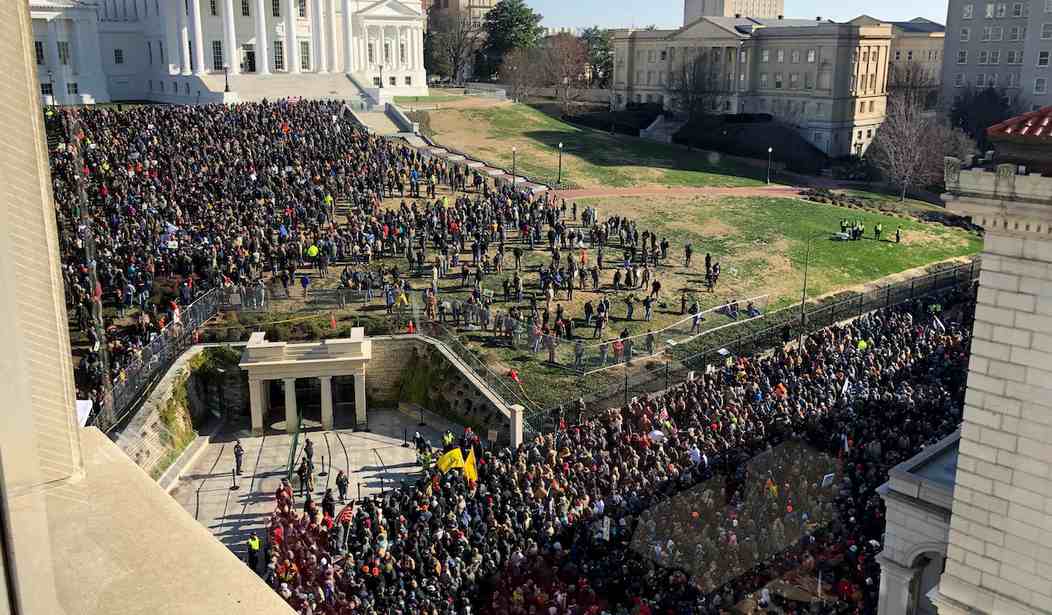On January 20, as Americans remembered civil rights hero Martin Luther King, Jr., an estimated 10,000 people peacefully rallied in Richmond, Va., to protest the recent introduction of highly contentious gun-control bills into the state legislature. Motivated in part by the “Second Amendment Sanctuary” movement that has seen over 100 Virginia counties and cities pass measures denouncing—and in some cases, preemptively refusing to enforce—constitutionally suspect gun laws, some Virginians at the rally began chants of “We will not comply.”
Many gun-control advocates have denounced these chants (and the Second Amendment Sanctuary movement itself) as undemocratic and anti-American. While this reaction was predictable, voicing a collective refusal to comply with laws perceived as unconstitutional or unjust is a fundamental part of American democratic discourse. In fact, the mantra “we will not comply” helped set the stage for America as it exists today.
In 1765, the British Parliament passed the Stamp Act, which imposed a tax on nearly every piece of paper used by the American colonists. The colonists considered this a direct tax on them without the approval of the colonial legislatures — a flagrant violation of longstanding legal precedent and an affront to their rights as Englishmen.
Threats of non-compliance and public protests so troubled Parliament that the Act was repealed before ever being put into effect.
Thus began nearly two decades of actual and threatened Colonial non-compliance with British laws that increasingly threatened the rights and liberties of the colonists. This included widespread non-compliance with laws that severely curtailed the ability of colonists to keep and bear arms.
Americans routinely circumvented or ignored bans on the importation of firearms and powder, and eventually resorted to armed defensive action against British attempts to confiscate guns and powder stores from colonial communities.
Recommended
Non-compliance with federal laws mandating the return of escaped slaves was rampant throughout northern states prior to the Civil War. In 1850, the Vermont legislature went so far as to pass a law effectively requiring state judicial and law enforcement officers to act in direct opposition to the federal Fugitive Slave Law.
Even in jurisdictions that did not act officially to condone non-compliance, individual non-compliance with federal slave laws was nonetheless widespread. Moreover, a generally lax approach to local enforcement in the north raised the ire of Southern States, where calls abounded for the federal government to send in military units to ensure adequate enforcement.
Importantly, many abolitionists refused to keep their intentions quiet—they, too, were vocal about their refusal to comply with laws they considered both unconstitutional and morally unjust. “We will not comply” was very much a general refrain of the now-beloved abolitionist movement.
Non-compliance permeated democratic discourse throughout the 20th century, as well. Some of the most revered figures of the Civil Rights Era were actually brought to the national spotlight by acts of non-compliance. Rosa Parks refused to comply with a city ordinance mandating segregated buses that would force her to the back of the bus. Hundreds refused to comply with state laws by engaging in sit-ins. Martin Luther King, Jr., spent periods in jail for his repeated refusals to comply with court orders.
Of course, America’s history with non-compliance and civil disobedience has also been complicated. Not all acts of non-compliance are later held to be meritorious. Many times, one side’s appeal to a higher law is another side’s accusation that the rule of law has been betrayed.
Non-compliance with school integration orders resulted in sometimes-violent standoffs among local, state and federal agencies, and history has not treated these acts of noncompliance kindly.
Non-compliance with alcohol laws during the Prohibition Era helped foster the rise of gangster violence (though, interestingly enough, widespread non-compliance was one of the major underlying factors leading to Prohibition’s eventual repeal).
During the Vietnam War, an estimated tens of thousands of young draft-eligible men faced severe criticism and legal consequences for refusing to comply with what they perceived to be an unjust draft system that would send them to fight in an unjust war.
But the fact that history judges some acts of non-compliance more harshly than others does not negate the reality of history itself. It merely reminds us that threats of non-compliance should not be undertaken lightly. They should be based on well-reasoned and principled appeals that will withstand the judgment of our descendants.
Threatening non-compliance is not unique to modern gun owners, nor unique to modern American discourse.
“We will not comply” is neither an undemocratic threat nor an un-American resolve.
It is a longstanding part of democratic discourse, and an utterly American promise to strive for compliance with a higher law.
























Join the conversation as a VIP Member